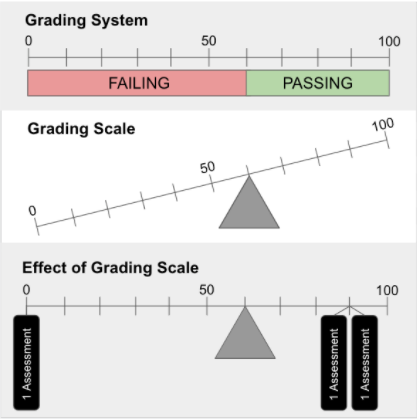
The push for minimum grading (ie. - giving 50% instead of 0 for missing work) often creates friction in a staff because it isn't approached correctly. It's a stop-gap solution for a bigger problem that's never truly addressed.
A thread...
1/8
A thread...
1/8
It's a solution to keep a student from experiencing catastrophic failure, meaning the significant impact of a single score on the student's possibility for success.
If I miss one assignment, I have to get two 90% scores just to get up above passing.
2/8
If I miss one assignment, I have to get two 90% scores just to get up above passing.
2/8

However, in reality what it does is allow a school or district to continue embracing harmful methods of calculating grades while simply mitigating the harm. This is why I don't like grade minimums. It keeps the harmful context and minimally protects students.
3/8
3/8
The issue grade minimums try to cover up is that we are averaging all of a student's attempts at learning over time and calculating their final grade from that. This means that every single mistake is counted and held against the student.
4/8
4/8
The solution is more complicated, though. The reason scores are often calculated over time is because (a) most grade books are task-aligned, not learning-aligned, which essentially means every task must be counted because it isn't connected to a larger purpose...
5/8
5/8
And because (b) students often aren't afforded multiple opportunities to demonstrate competency on a specific skill as a result of this lack of meaningful alignment to a learning outcome. If we were truly valuing multiple attempts, we wouldn't penalize early mistakes.
6/8
6/8
What to do? First off, if your school uses harmful methods of calculating final grades, recognize that grade minimums do actually protect students from this messed up approach. Second, push for true assessment reform that organizes record-keeping by learning outcomes.
7/8
7/8
If you would like to read a more detailed explanation of this issue, here's a longer blog post where I break down an article that looks into this: teacher-totter.blogspot.com/2021/01/resear…
(Oh, and side note, grade minimums don't lead to grade inflation. Like, proven, they don't.)
8/8
(Oh, and side note, grade minimums don't lead to grade inflation. Like, proven, they don't.)
8/8
• • •
Missing some Tweet in this thread? You can try to
force a refresh


